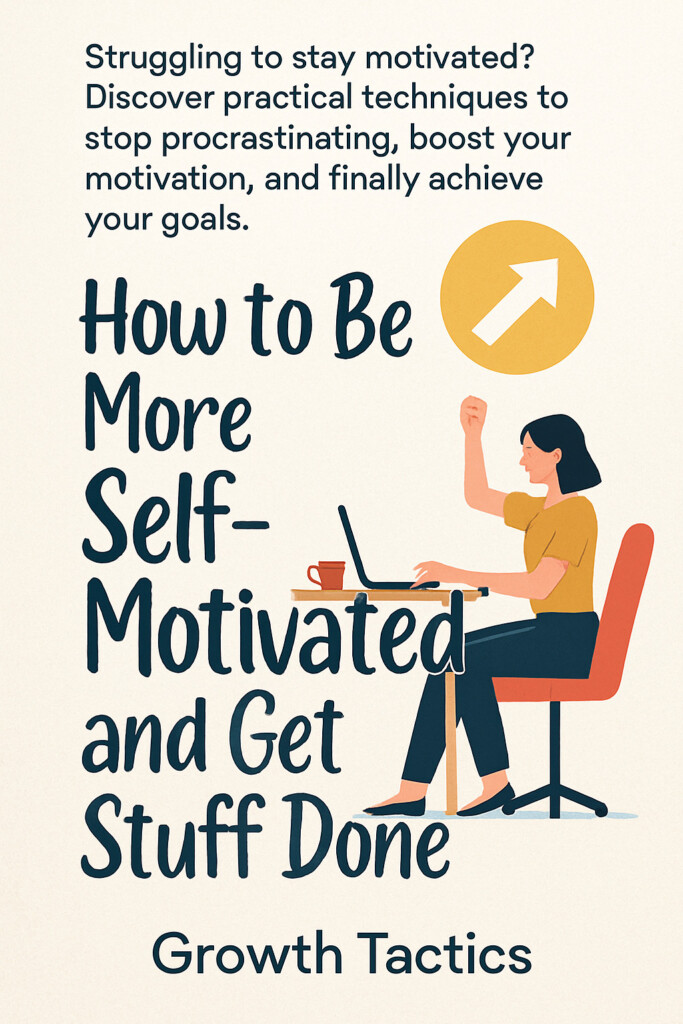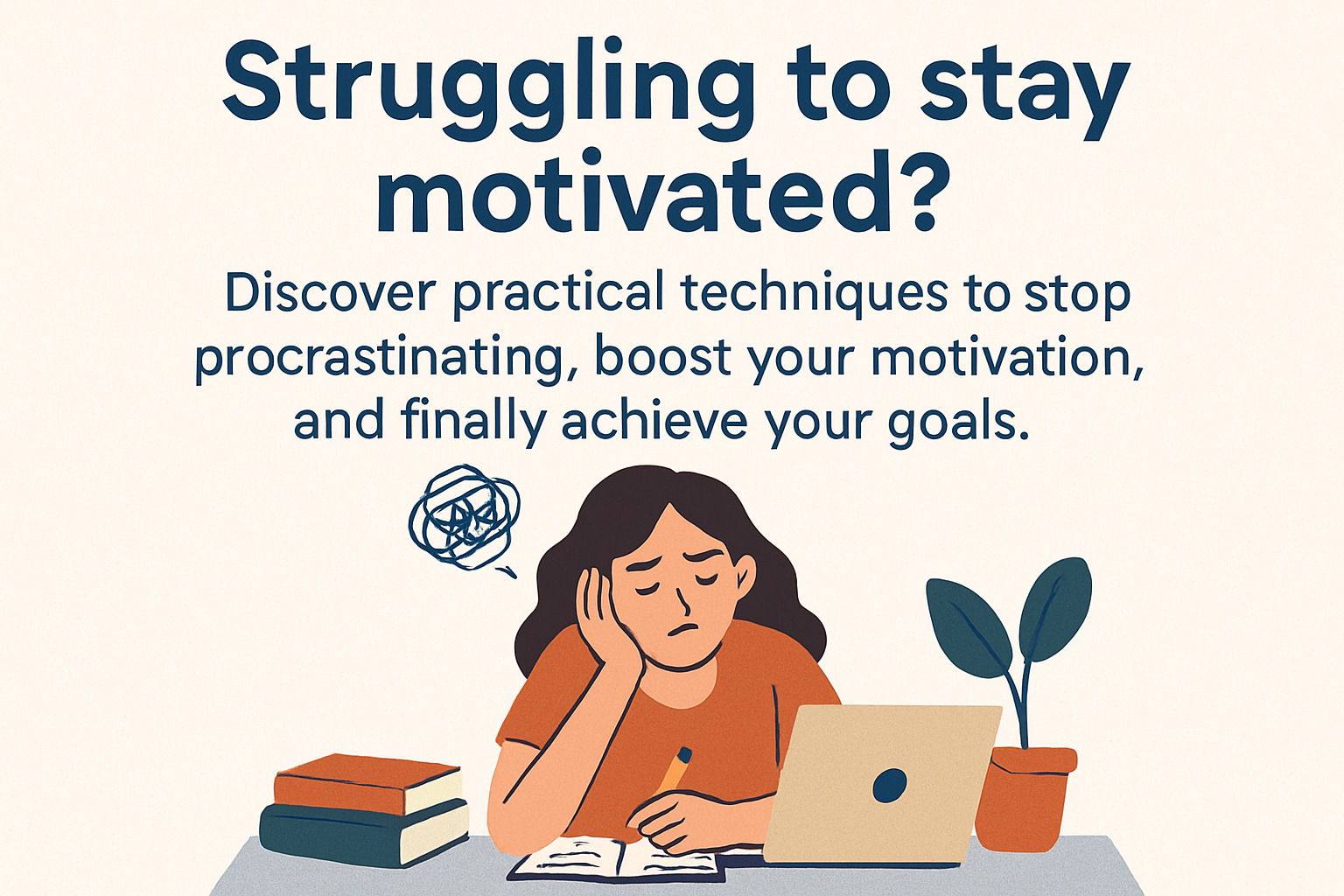Do you ever stare at your to-do list? You know exactly what needs to be done. Yet, you find yourself scrolling on your phone instead. Or maybe you start a new project with huge excitement. But after a few weeks, that fire fades. Procrastination creeps in. You start feeling unmotivated.
If this sounds familiar, you are not alone. I’ve been there. It is a common human experience. Knowing what to do is one thing. Finding the drive to do it is another challenge entirely.
This article is your guide. We will explore practical self-motivation techniques. These strategies will help you get and stay motivated. You can learn to push through those moments of doubt and inaction.
Jump To Section
Why Is Motivation Important?

This may sound like an obvious question, but why is it important to you? Think of it as the engine that drives you forward. It is the reason you get out of bed in the morning. It is the force that pushes you to apply for a new job, learn a new skill, or run that extra mile. Without it, we would not strive for anything.
Motivation is the foundation of action and success. It turns a simple thought into a concrete step. It transforms a dream into a plan. Understanding what fuels you is the first step toward taking control of your life.
Intrinsic vs. Extrinsic Motivation
To truly understand how to stay motivated, we need to look at its two main types. Not all motivation is created equal.
- Intrinsic motivation comes from within. You do something because of the interest and enjoyment you feel. It is about the personal satisfaction the task at hand brings you.
- Extrinsic motivation comes from outside sources. You do something for an external reward or to avoid punishment. This could be a paycheck, a promotion, or praise from others.
While extrinsic rewards can be a great incentive, intrinsic motivation is the key to long-term success. It is more sustainable. When you genuinely love what you do, you do not need someone else to push you. The drive is already there.
The best motivation is when you can mix both external and internal motivation to achieve your goals.
| Type of Motivation | Source | Example | Sustainability |
|---|---|---|---|
| Intrinsic | Internal satisfaction, enjoyment | Learning guitar because you love music. | High and long-lasting |
| Extrinsic | External rewards, praise, money | Working overtime to get a bonus. | Can wane or disappear |
Motivation and Your Well-Being
Strong motivation does more than just help you get stuff done. It has a huge impact on your mental health and self-esteem. When you work toward a goal and see progress, you feel capable and confident. This sense of accomplishment is a powerful way to boost your mood.
Feeling in control of your direction builds resilience. You learn to handle a setback without letting it derail you completely. This is why motivation is important for more than just productivity; it’s vital for a fulfilling life.
Connecting your actions to a deeper purpose makes any task more meaningful. Identifying your purpose is a powerful first step. When you know why you are doing something, the how becomes much easier to figure out.
How to Boost Your Initial Motivation

Getting started is often the hardest part. That initial spark of motivation can feel elusive. But you can cultivate it. You do not have to wait for inspiration to strike. Here are some powerful self-motivation techniques to get you going.
Start With Your “Why”
Before you work toward a big goal, take a moment. Ask yourself: Why do I want this? What do I truly want to change? Your “why” is your deepest reason for pursuing a goal. It is the emotional core that will keep you going when things get tough.
Write it down. Make it visible. When you feel your motivation levels dip, revisiting your “why” can reignite your passion. It reminds you that the effort is worth it.
I like to revisit my why often. Many times, I say it out loud even when I feel motivated, to reinforce it in my psyche.
Use the Power of Visualization
Your brain is a powerful tool. Use it to visualize your success. Close your eyes and imagine what it will feel like when you achieve your goals.
- What will you see?
- What will you hear?
- How will you feel in that moment?
Make the image as vivid as possible. The more real you can make it, the more effective it will be.
This mental rehearsal does more than just help you feel inspired. It actually primes your brain for success. It makes the goal feel real and achievable. This simple exercise can be a huge boost for your initial drive.
Set Clear and Achievable Goals
A vague goal like “get in shape” is hard to get motivated for. How do you know when you have achieved it? This is where SMART goals come in. This framework helps you create clear, actionable objectives.
SMART stands for:
- Specific: What exactly do you want to accomplish? Be precise.
- Measurable: How will you track your progress? Use numbers.
- Achievable: Is your goal realistic? Set yourself up for success.
- Relevant: Does this goal align with your “why”?
- Time-bound: When will you achieve this goal? Set a timeframe.
Here is an example of turning a vague goal into a SMART goal:
| Vague Goal | SMART Goal |
|---|---|
| “I want to write more.” | “I will write at least 500 words for my novel every morning from 8 AM to 9 AM, Monday through Friday, to finish the first draft in three months.” |
Setting goals this way gives you a clear roadmap. You know exactly what needs to be done, which makes it much easier to start.
Break It Down Into Small Steps
A big goal can feel overwhelming. Looking at the entire mountain can make you want to quit before you even start. Don’t try to climb the whole mountain in one step. The secret is to focus on the very next step.
Break your large goal into the smallest possible actions. If your goal is to clean the entire house, your first step might be “clear off the kitchen counter.” That is it. Just one small task.
Completing these small steps creates momentum. Each tiny win provides a sense of accomplishment. This builds your confidence and makes it easier to tackle the next step. You can keep the momentum going, one small action at a time.
Ways to Stay Motivated for the Long Haul

Starting is one thing. Keeping that fire burning is another. Motivation can naturally wane over time. Life gets in the way. Challenges arise. Here are proven ways to get and stay motivated for the long journey.
Track Your Goals and Progress
One of the best ways to get and stay motivated is by seeing progress. When you can look back and see how far you have come, it provides a massive boost to your drive.
Find a method that works for you:
- Journaling: Write down your daily or weekly achievements.
- Apps: Use habit trackers or project management tools.
- Calendars: Mark off each day you work on your goal.
- Visual Charts: Create a progress bar you can fill in.
Tracking your goals and progress makes your efforts tangible. It proves that your hard work is paying off. This visual feedback can help you stay motivated even when the finish line feels far away.
Create a Motivational Work Environment
Your surroundings have a big impact on your energy levels and focus. A cluttered, distracting space can drain your motivation. A clean, organized, and inspiring work environment can promote productivity.
Consider these tips:
- Declutter your space: A clear desk can lead to a clear mind.
- Add inspiration: Put up motivational quotes or images of your goals.
- Minimize distractions: Turn off phone notifications. Find a quiet place to work.
- Surround yourself with positive people: The energy of others is contagious. Spend time with people who support and encourage you.
Your environment should be a place that helps you feel motivated, not one that fights against you.
Practice Positive Self-Talk
The voice inside your head can be your biggest cheerleader or your harshest critic. Negative self-talk (“I can’t do this,” “I’m going to fail”) is a quick way to kill your motivation.
You need to actively practice positive self-talk. This is not about ignoring reality. It is about challenging your negative thoughts and reframing them.
| Instead of This… | Try This… |
|---|---|
| “This is too hard.” | “This is a challenge, but I can figure it out step-by-step.” |
| “I messed up again.” | “I learned a valuable lesson from that mistake.” |
| “I’ll never finish this.” | “I am making progress toward my goal every day.” |
I catch my inner voice talking negatively all the time, and I change the narrative. Your inner dialogue shapes your reality. Using positive self-talk builds resilience and reinforces your belief in your ability to succeed. It is a crucial skill to cultivate.
Find an Accountability Partner
It is easy to let yourself off the hook. It is harder when you know someone you trust is going to ask about your progress. An accountability partner can be a friend, a family member, or a colleague.
Share your one goal with them. Schedule regular check-ins. This simple act can dramatically increase your chances of success. Your partner can:
- Celebrate your wins with you.
- Offer encouragement during a setback.
- Provide a different perspective on an obstacle.
- Give you that gentle nudge you need to stay on track.
Knowing someone else is invested in your success can be a powerful incentive.
What to Do When You Lose Motivation
It happens to everyone. One day you are on fire, and the next, you are feeling unmotivated. It is completely normal for your motivation levels to fluctuate. The key is not to panic or see it as a total failure.
When you lose motivation, it is a signal. Your mind or body is telling you something. Instead of forcing your way through, take a moment to listen. Here is how to get back on track.
Reconnect With Your Purpose
The first thing to do is revisit your “why.” Why did you start this journey in the first place? What did you want to change?
Pull out that piece of paper where you wrote down your purpose. Reread it. Say it out loud. Remind yourself of the vision you have for your future. This can often be the simple way to boost your spirit and remind you that the struggle is temporary. The reward is worth it.
Take a Strategic Break
Sometimes, feeling unmotivated is a sign of burnout. You cannot operate at 100% all the time. Pushing through exhaustion will only lead to more frustration and lower-quality work.
Allow yourself to rest. This is not quitting; it is recharging.
- Take a day off completely.
- Go for a walk in nature.
- Listen to your favorite playlist of upbeat music.
- Spend time on a hobby you love.
- Ensure you are maintaining a healthy work-life balance.
Managing your energy levels is just as important as managing your time. A strategic break can restore your focus and help you return to your task at hand with renewed vigor.
Adjust Your Plan

If you consistently lose motivation for a specific task, it might be a sign that your plan needs an update. The strategy that got you started may not work anymore. That is perfectly okay.
Be flexible. Assess what is working and what is not.
- Is the goal still relevant?
- Are your small steps too big? Break them down even further.
- Is your timeframe too aggressive? Adjust it.
- Do you need to learn a new skill to overcome an obstacle?
Do not be afraid to set new goals or change your approach. Being adaptable is a sign of strength, not weakness. A new plan can bring a fresh wave of motivation.
When to Get Help from a Coach or Mentor
Sometimes, our own self-motivation techniques are not enough. If you are facing persistent low motivation, it might be time to seek outside support. There is no shame in asking for help; it is a smart move toward personal growth.
Know When You Need Help
It is important to distinguish between a temporary slump and something more serious. If your lack of motivation is accompanied by other symptoms like persistent sadness, changes in sleep or appetite, or a loss of interest in things you once enjoyed, it could be related to mental health issues. In this case, please reach out to a therapist or a doctor.
But if you are feeling stuck and need guidance on your goals, a coach or mentor could be the perfect solution.
The Role of a Coach or Mentor
A coach or mentor provides an invaluable outside perspective. They are not emotionally tied to your situation, so they can see things you might miss.
Here is what they can offer:
- Accountability: They provide structure and ensure you follow through on your commitments.
- Guidance: They can help you navigate a tough obstacle or a difficult decision.
- Strategy: A coach can help you develop the behavioral patterns needed for long-term success.
- Encouragement: They are a source of motivational support, especially when you start to doubt yourself.
They can help you stay focused and work toward your goals with greater clarity and confidence.
Cultivating Resilience and Growth
A good coach does more than just help you stay motivated. They help you cultivate resilience. They teach you how to bounce back from a setback and view challenges as opportunities for growth.
They will challenge you to step outside your comfort zone. They will help you identify limiting beliefs and replace them with empowering ones. Working with a coach or mentor is an investment in your long-term personal growth. They can promote skills that will serve you in all areas of your life.
Finding the Right Person
How do you find a coach or mentor?
- Look within your network: A senior colleague or a respected professional in your field could be a great mentor.
- Use professional platforms: Websites like LinkedIn are great for finding a professional coach.
- Ask for recommendations: Talk to friends or colleagues who have worked with a coach.
- Do your research: Look for someone with experience in the area where you need help. Most coaches offer a free introductory call to see if it is a good fit.
Finding the right person can be a game-changer on your journey to achieving goals.
Conclusion
Self-motivation is not a magical trait you are born with. It is a skill. It is a muscle that you can train and strengthen over time. Like any skill, it requires practice and patience.
You now have a toolkit to help you get and stay motivated. You have the strategies to overcome procrastination and keep the momentum going. Remember to be kind to yourself. Some days will be harder than others. The goal is not perfection; it is progress.
Your journey starts with a single step. Do not feel like you have to implement everything at once. Pick one strategy from this article that resonates with you. Just one. Start with that today. Take that first small step to boost motivation and begin building the life you want to live. You can do this.








